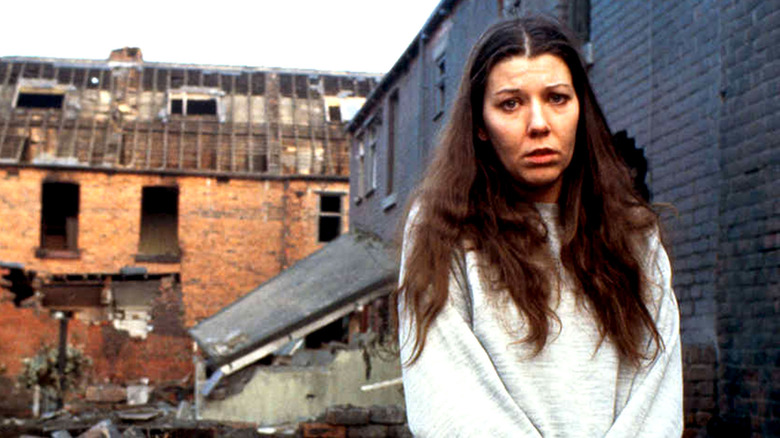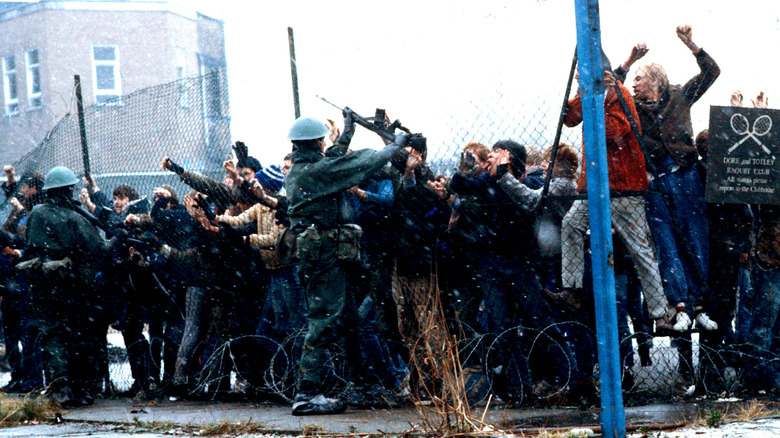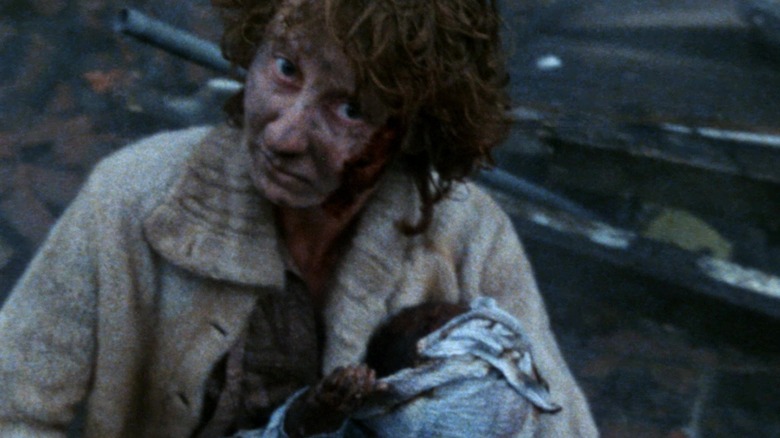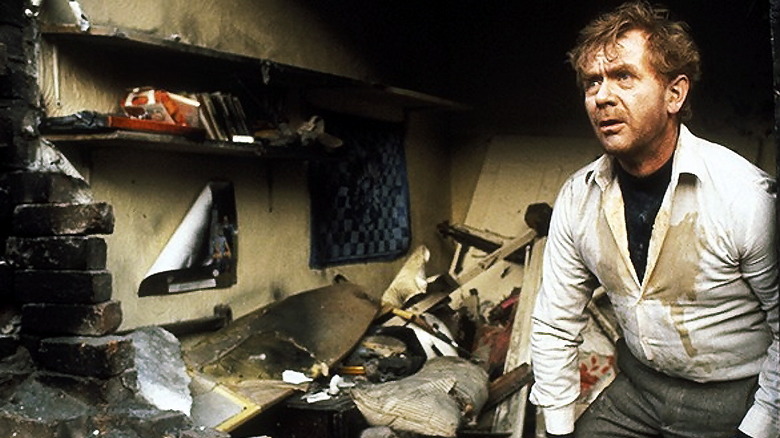The Apocalyptic TV Movie That Shook Britain To Its Core
I have always credited my mum and dad for having a big hand in my passion for cinema. They had a pretty cool taste in movies for parents, and were very lenient about what I watched as a kid. As a result, I saw films like "The Thing," "Robocop," and the "Dollars Trilogy" well before the certificate on the VHS box recommended.
There was one occasion, though, where I wished they were a little more strict about this. One night, I came downstairs to find my mum watching "Threads," Mick Jackson's unbelievably harrowing drama about a nuclear bomb falling on Sheffield, UK. Instead of sending me straight back to bed, she let me watch for a while. I don't know exactly how much I saw, but it was enough to make me spend the next six months cowering under my bed covers every night, waiting for the nukes to fall.
When the film first aired on the BBC in September 1984, there was a very real prospect of a nuclear conflict. Living less than 20 miles from RAF Bentwaters, used by the US Air Force during the Cold War, my parents feared the worst if anything kicked off between the US and the USSR.
As a family, we'd talked about what to do if we heard sirens indicating the four-minute warning, which was the approximate time it would take warheads launched from the Soviet Union to reach us in Old Blighty. If it was a weekday, I'd be at school and both my parents at work, so the plan was to scramble to my nan's house as fast as possible so we could all die together as a family. The whole prospect profoundly scared me; it took at least fifteen minutes to get there on my bike.
The premiere of "Threads" became known as "The night the country didn't sleep" (via Examiner), and the Beeb has only screened it twice since 1984. Over the years it has retained its notoriety as one of the most harrowing films ever made, often lumped in the same basket as "Salò, or the 120 Days of Sodom" and "Come and See."
Does "Threads" still deserve that fearsome reputation, or is it just a grim Cold War relic? I've dreaded watching it again for over 35 years now, so I thought I'd give it another bash to find out.
Threads in Context
"Threads" came with a high pedigree. The screenplay was from Barry Hines, best known for co-adapting his novel "A Kestrel for a Knave" for Ken Loach's landmark slice of kitchen sink realism, "Kes." Hines grew up in Barnsley, a mining town less than 20 miles up the M1 from Sheffield, and his keen ear for the Yorkshire dialect gave the drama an earthy authenticity. Meanwhile, director Mick Jackson, who went on to have a successful Hollywood career with films Like "The Bodyguard" and "Volcano," knew a bit about the subject of nuclear warfare. In 1982, he had produced a documentary for the BBC science program "Q.E.D." called "A Guide to Armageddon" and spent months interviewing experts in the UK and US about thermonuclear war and its after-effects.
"Threads" was produced at a time when protests against nuclear armament were growing in the U.K., with groups like the CND (Campaign for Nuclear Disarmament) among the most vocal. Sheffield, the city where "Threads" is set, was declared a "Nuclear Free Zone" by the local council (via Sheffield City Council). Prime Minister Margaret Thatcher had spent billions acquiring the Trident missile, which had "the ability to launch nearly three times as many warheads against Soviet cities from each submerged submarine, and to launch them from a wider area." (via The Guardian). Public interest intensified when "Panorama," the BBC's current affairs program, leaked content from the government's "Protect and Survive" public information campaign.
"Protect and Survive," no doubt intended as reassurance to the public, had the unfortunate effect of coming across as both offhandedly callous and hopelessly naive. With stark graphics that recall the wintry desolation of other infamous British public information films from the '70s and '80s, and an impersonal voice-over by Patrick Allen, it is truly terrifying stuff (you can check it out on Youtube). It gives helpful hints about what to do in the event of a nuclear attack, from building a lean-to fallout shelter in your house with interior doors, to bagging deceased members of the household and covering them up outside for later re-burial.
The threat of nuclear warfare was at its highest since the Cuban Missile crisis. In March 1983, President Ronald Reagan labelled the Soviet Union an "evil empire" (via BBC) and a few weeks later announced his "Star Wars" program, the Strategic Defense Initiative, a high-tech missile defense system intended to blow up incoming Soviet warheads from space (via History).
A looming nuclear holocaust found its way into British pop culture of the era. The sitcom "Only Fools and Horses" featured an episode where the wheeler-dealer Trotter family acquire a dodgy nuclear fallout shelter, only to build it on top of their block of flats. In the more anarchic "The Young Ones," the moronic student housemates respond to an unexploded nuke crashing through their roof by making a shelter under their kitchen table. "Two Tribes," the hit single from Frankie Goes to Hollywood, opens with the sound of air-raid sirens and a cameo from Patrick Allen's infamous "Protect and Survive" narration.
That government campaign, with its pathetic DIY apocalypse survival tips, is directly quoted in the two key films it inspired: "When the Wind Blows," from Raymond Brigg's 1982 graphic novel, and Jackson's "Threads."
The Enduring Shock Value of Threads
Against this backdrop of omnipresent nuclear threat came "Threads," which Jackson absolutely didn't want to be another "The Day After," an American TV movie from the previous year on the same topic (via The New Statesman):
"I mean, the hospital scene in it — the electricity was working! The idea of nuclear war informing a new species of made-for-TV disaster movies was the worst thing that could happen, to my mind. I wanted to show the full horror. I felt that was absolutely my responsibility."
The film starts in the realm of kitchen sink realism, introducing us to working-class Jimmy Kemp (Reece Dinsdale) and middle-class Ruth Beckett (Karen Meagher), a young couple who unexpectedly find themselves facing an unplanned pregnancy. They decide to keep the baby and get married. Jimmy's dad, Mr. Kemp (David Brierley), is less than supportive, giving him grief for trying to start a family in the middle of a recession, hinting at the socio-economic pressures the north of England was facing under Margaret Thatcher's Conservative government at the time (via Metro Politics). Meanwhile, captions tell us that Sheffield is the UK's fourth-largest city (now the 7th) and an important industrial hub in close proximity to an airbase.
As the dairy milk float trundles along its morning route, a paper girl delivers the newspaper, and people go about their day-to-day lives, we hear snippets on the radio and TV news reports of an escalating conflict in the Middle East. Tensions are growing between the US and the USSR, but at first, people aren't all that interested; in the first scene, Jimmy switches over to the football scores. Yet as the crisis grows, they start paying more attention. Meanwhile, local authorities prepare for the eventuality of an attack, establishing a command center in the basement of Sheffield Town Hall, and frequent captions and narration fill in the details about the crisis and emergency planning. This first act, moving forward with methodical urgency, creates a sense of unstoppable forces coming to a cataclysmic head. I found it especially unnerving in the current climate as I've been going about the daily grind with half an eye on the situation in Ukraine.
Then, around the 45-minute mark, the unthinkable happens. Sirens wail, people panic in the streets, and the first bomb falls. Despite its modest budget, the attack sequence of "Threads" is still one of the most harrowing scenes I've ever watched. Onlookers p**s themselves in fear, families are separated with no hope of getting back to one another, a couple huddles beneath their woefully inadequate lean-to shelter. Then comes the second blast, and Jackson gives us a few seconds of absolute silence that sucked all the air out of my lungs. This is when things get really, really bad — milk bottles melt, clothing combusts, windows blast inwards, buildings crumble, a mushroom cloud billows over the city. This sequence also features perhaps the only example of a Chekhov's Milk Float in an apocalyptic film, whereby if you show a battery-powered dairy delivery vehicle in the opening scene, you absolutely must show it aflame under a pile of rubble after the bomb drops.
The special effects in "Threads" are low-tech — ketchup and breakfast cereal for blood and burnt flesh — but Jackson is smart enough to turn limitations into advantages. The boxy ratio creates a terrible sense of intimacy and claustrophobia, drawing the viewer in and trapping them among the scenes of devastation. The grainy image helps blend the stock footage, and the stark stills he uses to bridge gaps are bone-chilling. Against the odds, there are even a few moments of gallows humor; a pair of soldiers recovering a bag of food from a looter they've just shot dead find a packet of crisps inside, only to complain about the flavor (Prawn Cocktail, a specifically British love-em-or-hate-em potato chip).
Threads And The Aftermath
The attack is utterly horrific, and that's not the worst part. "Threads" charts the aftermath well past the immediate fallout, chaos, and suffering. Many years after the attack, the survivors are reduced to half-mute, permanently shell-shocked, living ghosts locked into a harsh medieval existence of toiling the barren fields before dropping down dead, unburied and unmourned.
Jackson and Hines provide no false note of hope, for which I was strangely pleased. Post-apocalyptic movies have become a big blockbuster genre and they're often like, "Hey! If we can just stop Immortan Joe hoarding all the water, maybe we can start getting things back to normal around here!"
There are no such illusions in "Threads," and the abject despair was the most troubling aspect for me this time around. For all intents and purposes, this is the end of the world, and some people were just unlucky enough to survive it. Without communication or transport, other UK cities like London, Birmingham, and Manchester may as well not exist. Civilization will take many decades, or even centuries, to even start building towards recovery. If at all. Life as we know it is over.
"The Night The Country Didn't Sleep"? Well, no s**t. Sobering, shocking, heart-rending, visceral, devastating, harrowing, depressing ... that "Threads" is all those things is beyond any doubt. It is also a brilliant piece of film-making; authoritative, well-paced, and totally compelling despite its brutally unflinching content. Every choice Jackson makes is the right one. There is plenty of nightmare fuel here, but he astutely cuts away from the latest terror before it forces us to check out completely, and leaves one last shock to our imagination. Hauntingly, some characters just drop out of the story, never to be seen again. Like their loved ones, we never find out exactly what happened to them. The format, somewhere between drama and matter-of-fact documentary, provides us with just enough distance to make it bearable.
After my bad experience watching "Threads" as a kid, I was profoundly upset by the film again as an adult. I was useless all weekend after seeing it, although writing this piece has helped me process it a little more. I suspect it will trouble me for the next few weeks, months, perhaps the rest of my life. Despite this, some positive emotions came out of it. As a father of two, I felt a strong sense of resolve and committed to prepping a little in case of an emergency. I also felt deeply grateful to Hines and Jackson; to create such a film must have surely placed a heavy burden on the soul, yet their vision of the apocalypse is unwavering and the dark spell it casts is absolute. It feels totally truthful, and it is necessarily bleak. As governments continue playing war games, maybe we need a "Threads" revival to remind people — as if it should ever need saying in the first place — that nuclear warfare is the absolute worst thing that could possibly happen to mankind.
Mick Jackson has a letter to that effect from Neil Kinnock, who was the U.K.'s Leader of the Opposition at the time (via New Statesman):
"I'd like to thank you and everyone involved in the making of Threads for your important and impressive work. The story must be told time and time again until the idea of using nuclear weapons is pushed into past history. Don't, by the way, be troubled by the possibility that some people might be inured to the real thing by seeing horrifying films. The dangers of complacency are much greater than any risks of knowledge."
Should you see "Threads" if you haven't already? It's an incredibly powerful film, especially relevant now with the current crisis in Ukraine, but a tough one to recommend because it is so devastating. I think any reasonably mature viewer will be totally shattered by it, in the best sense. if you decide to watch it, just be prepared to have a difficult few days afterward. If you're really feeling brave, maybe make a night of it and watch as a double bill with "When the Wind Blows..."



